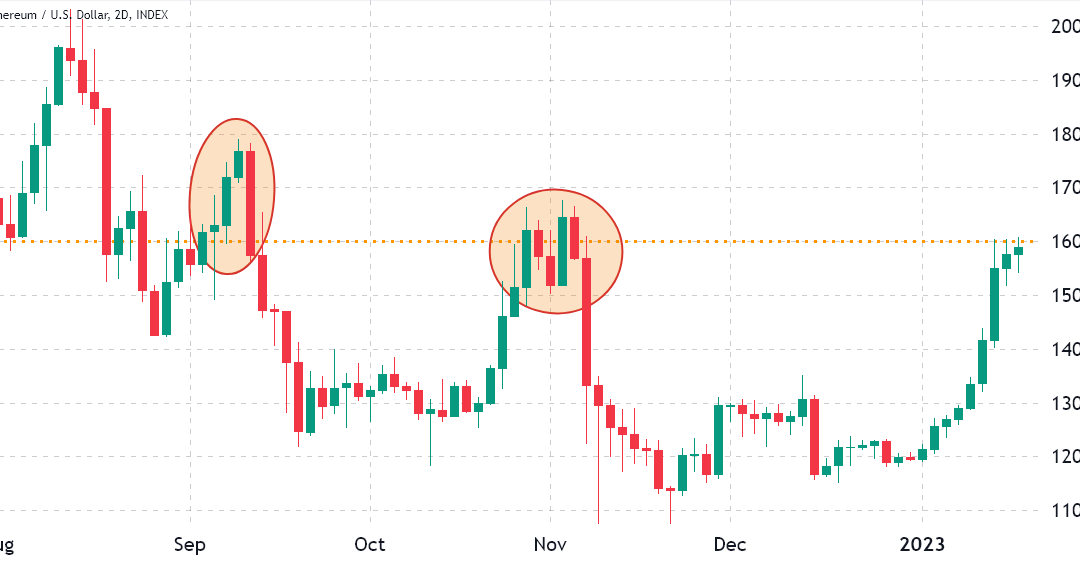Ethereum (ETH) price is struggling to overcome resistance at $1,600 and this is the altcoin’s third attempt since September 2022. Some would say the 33% year-to-date rally could be interpreted as a failed opportunity to breach the $200 billion market capitalization mark.
If Ethereum price were to break above $1,600, it would return Ether to a top-60 global tradable asset, surpassing giant multinational companies like Nike (NKE), Novartis (NVS), Cisco (CSCO) and Toyota (TM).
Unfortunately, at least for bullish traders, derivatives markets are not hinting that Ether will finally break the $1,600 resistance — at least, not until the U.S. Federal Reserve reverses its course of tightening the economy.
Bulls’ frustrations can partially be explained by Silvergate Bank’s $1 billion net loss in the latest quarter. The crypto-friendly bank laid off roughly 40% of its workforce on Jan. 5 and it now faces a class-action lawsuit over its FTX and Alameda Research dealings. The suit alleges that Silvergate aided and abetted FTX’s fraudulent activities and the exchanges’ breaches of fiduciary duty.
The negative newsflow continued on Jan. 17, as Japan’s deputy director-general of the Financial Services Agency’s Strategy Development and Management Bureau, Mamoru Yanase, argued that the crypto sector should face the same regulation as traditional banks and brokerages.
The fact that Ether continues to trade above $1,500 is a positive, but the most recent price pump closely followed an 8% gain by the Russell 2000 index. In addition, investors fear that data showing a reduction in inflation was the main driver behind the cryptocurrency market recovery, so any retreat in the stock market could trigger another wave of selling.
Consequently, investors believe that Ether could retrace its recent gains if the U.S. Federal Reserve keeps raising interest rates. Let’s look at Ether derivatives data to understand if the surprise pump positively impacted investors’ sentiment.
Ether’s 33% rally was not enough to instill confidence
Retail traders usually avoid quarterly futures due to their price difference from spot markets. Meanwhile, professional traders prefer these instruments because they prevent the fluctuation of funding rates in a perpetual futures contract.
The two-month futures annualized premium should trade between +4% to +8% in healthy markets to cover costs and associated risks. However, when the futures trade at a discount versus regular spot markets, it shows a lack of confidence from leverage buyers, which is a bearish indicator.

The chart above shows that derivatives traders remain in “fear mode” because the Ether futures premium is below the 4% threshold. This data indicates the absence of leverage buyers’ demand, although it does not signal that traders expect further adverse price action.
For this reason, traders should analyze Ether’s options markets to understand whether investors are pricing higher odds of surprise adverse price movements.
Options markets are neutral, adding strength to the $1.6K resistance
The 25% delta skew is a telling sign when market makers and arbitrage desks are overcharging for upside or downside protection.
In bear markets, options investors give higher odds for a price dump, causing the skew indicator to rise above 10%. On the other hand, bullish markets tend to drive the skew indicator below -10%, meaning the bearish put options are discounted.

The delta skew improved considerably since Jan. 14, declining from a neutral-to-bearish positive 10% to a neutral options pricing. The movement signaled that options traders became more comfortable with downside risks since the 60-day delta skew stands at negative 2%.
Related: Bitcoin and Ethereum correct as Bitzlato take down, tech layoffs and economic worries dominate headlines
Whales and market makers are yet to become optimistic according to options markets, but the absence of fear after a 33% rally is encouraging. Both options and futures markets point to pro traders fearing that the $1,600 resistance will continue to exert a negative impact on price.
In essence, a more effective measure from the FED is likely needed before crypto investors flip bullish — either signaling the interest rate hike is close to an end, or a shift on the strategy to curb inflation.
The views, thoughts and opinions expressed here are the authors’ alone and do not necessarily reflect or represent the views and opinions of Cointelegraph.
This article does not contain investment advice or recommendations. Every investment and trading move involves risk, and readers should conduct their own research when making a decision.














